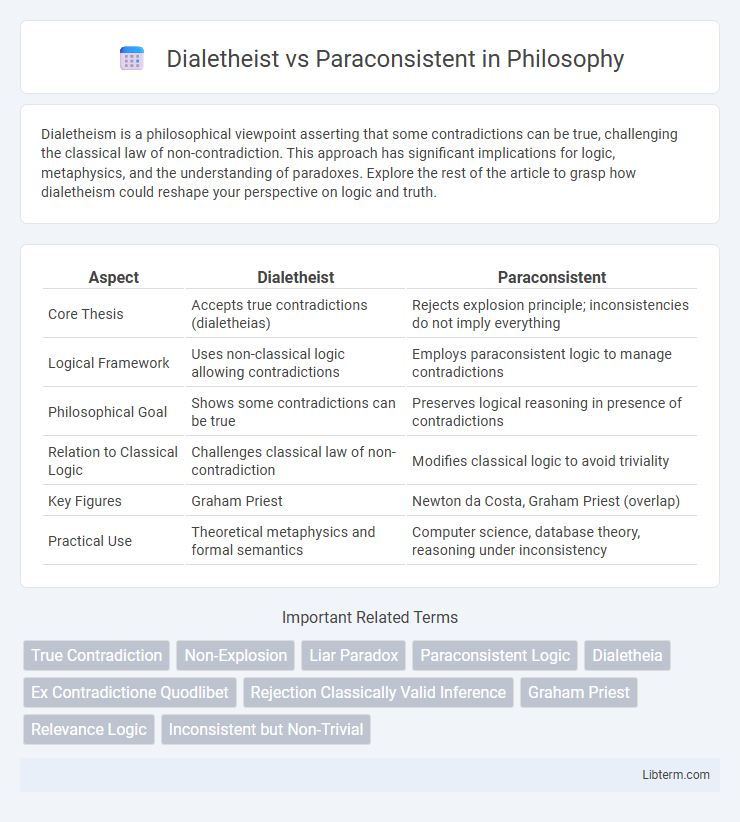Dialetheism is a philosophical viewpoint asserting that some contradictions can be true, challenging the classical law of non-contradiction. This approach has significant implications for logic, metaphysics, and the understanding of paradoxes. Explore the rest of the article to grasp how dialetheism could reshape your perspective on logic and truth.
Table of Comparison
| Aspect | Dialetheist | Paraconsistent |
|---|---|---|
| Core Thesis | Accepts true contradictions (dialetheias) | Rejects explosion principle; inconsistencies do not imply everything |
| Logical Framework | Uses non-classical logic allowing contradictions | Employs paraconsistent logic to manage contradictions |
| Philosophical Goal | Shows some contradictions can be true | Preserves logical reasoning in presence of contradictions |
| Relation to Classical Logic | Challenges classical law of non-contradiction | Modifies classical logic to avoid triviality |
| Key Figures | Graham Priest | Newton da Costa, Graham Priest (overlap) |
| Practical Use | Theoretical metaphysics and formal semantics | Computer science, database theory, reasoning under inconsistency |
Introduction to Dialetheism and Paraconsistency
Dialetheism is a philosophical stance asserting that some contradictions can be true, challenging the principle of non-contradiction by accepting true contradictions, or dialetheias. Paraconsistent logic provides a formal framework that tolerates contradictions without collapsing into triviality, enabling reasoning in systems where inconsistencies exist. These approaches intersect in addressing contradictions differently--dialetheism embraces true contradictions, while paraconsistent logic manages them to maintain logical coherence.
Historical Development of Dialetheist and Paraconsistent Logics
Dialetheist and paraconsistent logics emerged in the 20th century as responses to classical logic's limitations in handling contradictions. Dialetheism, notably advanced by Graham Priest in the 1970s, posits the existence of true contradictions, or dialetheias, challenging traditional notions of consistency. Paraconsistent logic, with roots traced back to Stanislaw Jaskowski and Newton da Costa, developed as a formal system to tolerate contradictions without triviality, influencing philosophical and computational theories about non-classical reasoning.
Core Principles of Dialetheism
Dialetheism asserts that some contradictions can be true, challenging the classical law of non-contradiction by accepting true dialetheias, or statements that are both true and false simultaneously. Core principles include the rejection of explosive inference, which in classical logic allows any conclusion to follow from a contradiction, and the embrace of paraconsistent logic frameworks to consistently handle these true contradictions. This position contrasts with general paraconsistent logic, which aims to avoid triviality from contradictions but does not necessarily affirm that contradictions are actually true.
Fundamental Concepts in Paraconsistent Logic
Dialetheism posits that some contradictions can be true, embracing true contradictions called dialetheias, while paraconsistent logic provides formal systems that avoid explosion, allowing contradictions without trivializing the entire system. Fundamental concepts in paraconsistent logic include the rejection of the principle of explosion (ex contradictione quodlibet), non-classical negation, and the ability to consistently reason in the presence of contradictory information. These logics enable reasoning frameworks where contradictory statements coexist without collapsing logical inference, supporting applications in inconsistent databases and formal epistemology.
Key Differences Between Dialetheism and Paraconsistency
Dialetheism asserts the existence of true contradictions, meaning some statements can be both true and false simultaneously, while paraconsistent logic provides a formal framework that tolerates contradictions without collapsing into triviality. Dialetheists adopt the philosophical stance that reality includes genuine dialetheias, whereas paraconsistent logicians develop systems preventing explosion (where an explosion allows any statement to be inferred from a contradiction) without necessarily endorsing dialetheism. The key difference lies in dialetheism's ontological commitment to true contradictions versus paraconsistent logic's methodological approach to managing contradictions in reasoning.
Philosophical Implications of True Contradictions
Dialetheism asserts that some contradictions are true, challenging classical logic's law of non-contradiction and allowing for the coexistence of contradictory truths without collapse into trivialism. Paraconsistent logic provides the formal framework to handle contradictions without explosion, enabling the systematic study of dialetheic claims within a controlled logical environment. Philosophically, accepting true contradictions redefines notions of truth and contradiction, forcing a reevaluation of fundamental logical and metaphysical principles.
Applications of Dialetheist and Paraconsistent Logics
Dialetheist logic, which allows true contradictions, is primarily applied in resolving semantic paradoxes like the Liar Paradox and in modeling inconsistent but non-trivial philosophical theories. Paraconsistent logic, designed to handle contradictions without explosion, finds practical applications in database theory, artificial intelligence, and legal reasoning where inconsistent information must be managed reliably. Both logics enhance computational systems by enabling robust reasoning in contexts plagued by conflicting or incomplete data.
Notable Theorists and Foundational Works
Dialetheism, championed by Graham Priest with foundational works like "In Contradiction," posits that some contradictions can be true, challenging classical logic's principle of non-contradiction. Paraconsistent logic, developed by Newton da Costa and furthered by scholars such as Jaskowski, provides formal systems that tolerate contradictions without leading to triviality, exemplified in da Costa's "On the Theory of Inconsistent Formal Systems." Both fields intersect yet diverge in scope, with dialetheism embracing true contradictions and paraconsistent logic offering a broader framework for reasoning in the presence of inconsistency.
Criticisms and Challenges
Dialetheism faces criticism for violating classical logic by accepting true contradictions, raising concerns about logical explosion and undermining consistency standards. Paraconsistent logic, while avoiding explosion by tolerating contradictions, grapples with challenges in formalizing inference rules and maintaining intuitive truth values. Both approaches struggle with widespread acceptance due to debates over their philosophical coherence and practical applicability in mathematical and linguistic frameworks.
Future Directions in Non-Classical Logic Research
Future directions in non-classical logic research emphasize advancing dialetheism and paraconsistent logics to better handle contradictions in complex systems. Emerging studies focus on refining formal frameworks that integrate dialetheistic acceptance of true contradictions with paraconsistent mechanisms to avoid triviality. Development of computational models and applications in artificial intelligence and knowledge representation underscores the practical significance of these logics in managing inconsistent information effectively.
Dialetheist Infographic

 libterm.com
libterm.com